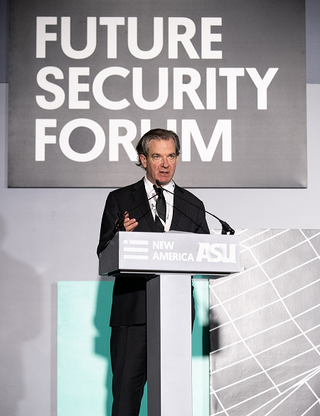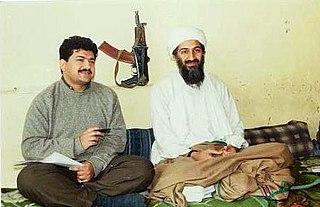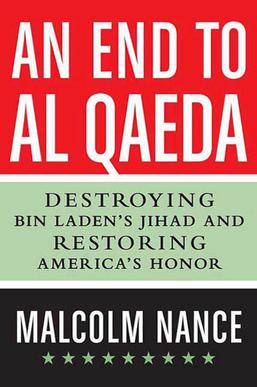Related Research Articles

Al-Qaeda is a pan-Islamist militant organization led by Sunni jihadists who self-identify as a vanguard spearheading a global Islamist revolution to unite the Muslim world under a supra-national Islamic caliphate. Its membership is mostly composed of Arabs but also includes people from other ethnic groups. Al-Qaeda has mounted attacks on civilian, economic and military targets of the U.S. and its allies; such as the 1998 US embassy bombings, the USS Cole bombing, and the September 11 attacks. The organization is designated as a terrorist group by NATO, the UN Security Council, the European Union, and various countries around the world.

Osama bin Laden was a Saudi Arabian-born Islamist dissident and militant leader who was the founder and first general emir of al-Qaeda. Ideologically a pan-Islamist, he participated in the Afghan jihad against the Soviet Union and supported the activities of the Bosnian mujahideen during the Yugoslav Wars. After issuing his declaration of war against the Americans in 1996, Bin Laden began advocating attacks targeting U.S. assets in several countries, and supervised al-Qaeda’s execution of the September 11 attacks in the United States in 2001.

Peter Gregg Arnett is a New Zealand-born American journalist. He is known for his coverage of the Vietnam War and the Gulf War. He was awarded the 1966 Pulitzer Prize in International Reporting for his work in Vietnam from 1962 to 1965, mostly reporting for the Associated Press.

The Special Activities Center (SAC) is a division of the United States Central Intelligence Agency responsible for covert and paramilitary operations. The unit was named Special Activities Division (SAD) prior to 2015. Within SAC there are two separate groups: SAC/SOG for tactical paramilitary operations and SAC/PAG for covert political action.
The 055 Brigade was a guerrilla organization loyal to Osama bin Laden that was sponsored and trained by al-Qaeda, and was integrated into the Taliban between 1996 and 2001.

Peter Lampert Bergen is an American journalist, author, and producer who is CNN's national security analyst, a vice president at New America, a professor at Arizona State University, and the host of the Audible podcast In the Room with Peter Bergen.

The Battle of Tora Bora was a military engagement that took place in the cave complex of Tora Bora, eastern Afghanistan, from November 30 – December 17, 2001, during the final stages of the United States invasion of Afghanistan. It was launched by the United States and its allies with the objective to capture or kill Osama bin Laden, the founder and leader of the militant organization al-Qaeda. Al-Qaeda and bin Laden were suspected of being responsible for the September 11 attacks three months prior. Tora Bora is located in the Spīn Ghar mountain range near the Khyber Pass. The U.S. stated that al-Qaeda had its headquarters there and that it was bin Laden's location at the time.
American officials have reported that the late al Qaeda leader Osama bin Laden had numerous bodyguards. They reported that the detainees held in the Guantanamo Bay detention camp included at least 30 of Bin Laden's bodyguards.
Hamza bin Laden was a Saudi Arabian-born key member of al-Qaeda. He was a son of Osama bin Laden. On 25 July 2019, it was claimed by the American media that he was killed by a U.S. airstrike on the Afghanistan–Pakistan border. In 2024, unconfirmed media reports claimed that he was still alive and a senior leader of al-Qaeda.

The war on terror, officially the Global War on Terrorism (GWOT), is a global counterterrorist military campaign initiated by the United States following the September 11 attacks of 2001, and is the most recent global conflict spanning multiple wars. Some researchers and political scientists have argued that it replaced the Cold War.

Several sources have alleged that the Central Intelligence Agency (CIA) had ties with Osama bin Laden's faction of "Afghan Arab" fighters when it armed Mujahideen groups to fight the Soviet Union during the Soviet–Afghan War.
Yusuf al-Ayeri or Yusuf bin Salih bin Fahd al-Ayeri was a Saudi Arabian member of Al-Qaeda, and the first-ever leader of al-Qaeda in Saudi Arabia.

Osama bin Laden took ideological guidance from prominent militant Islamist scholars and ideologues from the classical to contemporary eras, such as Ibn Taymiyya, Ibn al-Qayyim al-Jawziyyah, Sayyid Qutb, Nizamuddin Shamzai and Abdullah Azzam. During his middle and high school years, bin Laden was educated in Al-Thager Model School, a public school in Jeddah run by Islamist exiles of the Muslim Brotherhood; during which he was immensely influenced by pan-Islamist ideals and displayed strict religious commitment. As a teenager, bin Laden attended and led Muslim Brotherhood-run "Awakening" camps held on desert outskirts that intended to raise the youth in religious values, instil martial spirit and sought spiritual seclusion from "the corruptions" of modernity and rapidly urbanising society of the 1970s in Saudi Arabia.

FDD's Long War Journal (LWJ) is an American news website, also described as a blog, which reports on the War on terror. The site is operated by Public Multimedia Incorporated (PMI), a non-profit media organization established in 2007. PMI is run by Paul Hanusz and Bill Roggio. Roggio is the managing editor of the journal and Thomas Joscelyn is senior editor. The site is a project of the Foundation for Defense of Democracies, where both Roggio and Joscelyn are senior fellows.

Bill Roggio is an American commentator on military affairs, and the managing editor of The Long War Journal. Prior to leading a team of online commentators, Roggio published the online weblog The Fourth Rail. Roggio was an active duty soldier in the United States Army in the 1990s.

The September 11 attacks were carried out by 19 hijackers of the Islamist militant organization al-Qaeda. In the 1990s, al-Qaeda leader Osama bin Laden declared a militant jihad against the United States, and issued two fatawa in 1996 and 1998. In the 1996 fatwa, he quoted the Sword Verse. In both of these fatawa, bin Laden sharply criticized the financial contributions of the American government to the Saudi royal family as well as American military intervention in the Arab world.

Obama's Wars is a 2010 book written by Pulitzer Prize–winning investigative journalist Bob Woodward. The book was published by Simon & Schuster and released on September 27, 2010. It focuses on the internal debates and divisions within the Obama administration regarding the handling of the United States' involvement in the ongoing Iraq and Afghanistan wars. Woodward was interviewed by ABC News anchor Diane Sawyer to promote the book as well as PBS journalist Charlie Rose.
Melmastyā́, or hospitality, is the requirement Pashtunwali places on all its tribesmen towards others, whether they are strangers or members of one's own tribe. Melmastyā́ requires hospitality and profound respect to be shown all visitors, regardless of distinctions of race, religion, national affiliation as well as economic status and doing so without any hope of remuneration or favour. Pashtuns will go to great extents to show their hospitality.

An End to al-Qaeda: Destroying Bin Laden's Jihad and Restoring America's Honor is a non-fiction book about counterterrorism strategies towards al-Qaeda, written by U.S. Navy retired cryptology analyst Malcolm Nance. The book describes how the September 11 attacks changed the traditional Muslim community around the globe. Nance criticizes the approach of the George W. Bush administration, including the verbiage and public presentations used in the War on Terror. The author argues al-Qaeda is not part of Islam but is instead a dangerous religious cult. Nance writes the United States should commit to better education with a public relations campaign to encourage traditional believers in Islam around the world to denounce al-Qaeda.
References
- ↑ "A Road Trip Driven by the Drought". Alta Online. 2022-12-21. Retrieved 2024-10-30.
- ↑ Schultheis, Rob (1996). "New York Times book review". ISBN 1558214348.
- 1 2 Mel D. Lane (1992). Library Journal review of Night Letters . ISBN 0517588617.
- 1 2 Andrew Welsh-Huggins (2008-06-27). "Tale of botched terror war marred by errors". The San Diego Union Tribune.
- ↑ Verna Noel Jones (2005-07-08). "The ongoing battle: Troubles and triumphs in post-invasion Iraq". Rocky Mountain News.